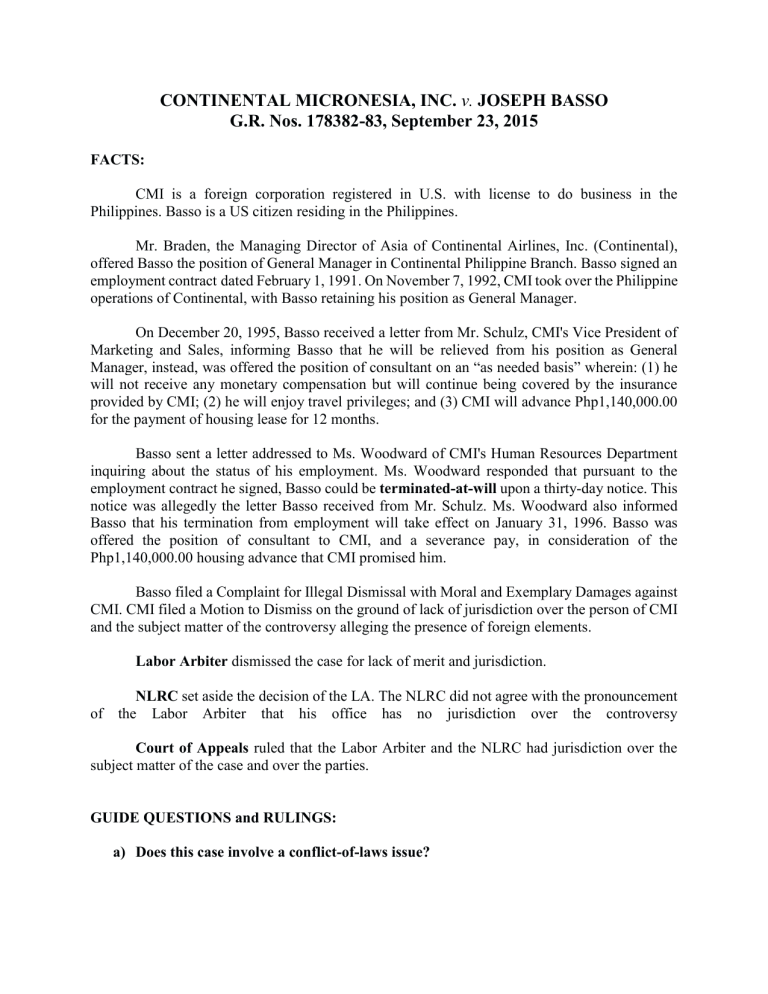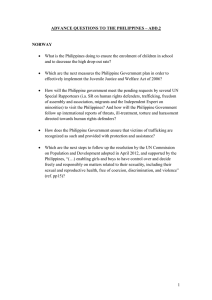
CONTINENTAL MICRONESIA, INC. v. JOSEPH BASSO G.R. Nos. 178382-83, September 23, 2015 FACTS: CMI is a foreign corporation registered in U.S. with license to do business in the Philippines. Basso is a US citizen residing in the Philippines. Mr. Braden, the Managing Director of Asia of Continental Airlines, Inc. (Continental), offered Basso the position of General Manager in Continental Philippine Branch. Basso signed an employment contract dated February 1, 1991. On November 7, 1992, CMI took over the Philippine operations of Continental, with Basso retaining his position as General Manager. On December 20, 1995, Basso received a letter from Mr. Schulz, CMI's Vice President of Marketing and Sales, informing Basso that he will be relieved from his position as General Manager, instead, was offered the position of consultant on an “as needed basis” wherein: (1) he will not receive any monetary compensation but will continue being covered by the insurance provided by CMI; (2) he will enjoy travel privileges; and (3) CMI will advance Php1,140,000.00 for the payment of housing lease for 12 months. Basso sent a letter addressed to Ms. Woodward of CMI's Human Resources Department inquiring about the status of his employment. Ms. Woodward responded that pursuant to the employment contract he signed, Basso could be terminated-at-will upon a thirty-day notice. This notice was allegedly the letter Basso received from Mr. Schulz. Ms. Woodward also informed Basso that his termination from employment will take effect on January 31, 1996. Basso was offered the position of consultant to CMI, and a severance pay, in consideration of the Php1,140,000.00 housing advance that CMI promised him. Basso filed a Complaint for Illegal Dismissal with Moral and Exemplary Damages against CMI. CMI filed a Motion to Dismiss on the ground of lack of jurisdiction over the person of CMI and the subject matter of the controversy alleging the presence of foreign elements. Labor Arbiter dismissed the case for lack of merit and jurisdiction. of NLRC set aside the decision of the LA. The NLRC did not agree with the pronouncement the Labor Arbiter that his office has no jurisdiction over the controversy Court of Appeals ruled that the Labor Arbiter and the NLRC had jurisdiction over the subject matter of the case and over the parties. GUIDE QUESTIONS and RULINGS: a) Does this case involve a conflict-of-laws issue? Yes, the SC held that there is a conflict-of-laws issue in this case that needs to be resolved first. Where the facts establish the existence of foreign elements, the case presents a conflict-oflaws issue. The foreign element in a case nay appear in different forms, such as in this case, where one of the parties s an alien and the other is domiciled in another state. In Hasegawa v. Kitamura, the SC stated that in the judicial resolution of conflict-of-laws problems, three consecutive phases are involved: jurisdiction, choice of law, and recognition and enforcement of judgments. In resolving the conflicts problem, courts should ask the following questions: 1. "Under the law, do I have jurisdiction over the subject matter and the parties to this case? 2. "If the answer is yes, is this a convenient forum to the parties, in light of the facts? 3. "If the answer is yes, what is the conflicts rule for this particular problem? 4. "If the conflicts rule points to a foreign law, has said law been properly pleaded and proved by the one invoking it? 5. "If so, is the application or enforcement of the foreign law in the forum one of the basic exceptions to the application of foreign law? In short, is there any strong policy or vital interest of the forum that is at stake in this case and which should preclude the application of foreign law? b) Is the local forum the convenient forum under the circumstances? Yes, the local forum or Philippine Court is the convenient forum. Under the doctrine of forum non conveniens, a Philippine court in a conflict-of-laws case may assume jurisdiction if it chooses to do so, provided, that the following requisites are met: (1) that the Philippine Court is one to which the parties may conveniently resort to; (2) that the Philippine Court is in a position to make an intelligent decision as to the law and the facts; and (3) that the Philippine Court has or is likely to have power to enforce its decision. All the requisites are present in this case. First, Basso may conveniently resort to our labor tribunals as he and CMI lad physical presence in the Philippines during the duration of the trial. CMI has a Philippine branch, while Basso, before his death, was residing here. Thus, it could be reasonably expected that no extraordinary measures were needed for the parties to make arrangements in advocating their respective cases. Second, The labor tribunals can make an intelligent decision as to the law and facts. The incident subject of this case (i.e. dismissal of Basso) happened in the Philippines, the surrounding circumstances of which can be ascertained without having to leave the Philippines. The acts that allegedly led to loss of trust and confidence and Basso's eventual dismissal were committed in the Philippines. As to the law, we hold that Philippine law is the proper law of he forum. Third, the labor tribunals have the power to enforce their judgments because they acquired jurisdiction over the persons of both parties. c) What is the applicable law? The applicable law is the Philippine Law. Choice-of-law rules invariably consist of a factual relationship (such as property right, contract claim) and a connecting fact or point of contact, such as the situs of the res, the place of celebration, the place of performance, or the place of wrongdoing. Pursuant to Saudi Arabian Airlines, we hold that the "test factors," "points of contact" or "connecting factors" in this case are the following: (1) The nationality, domicile or residence of Basso; (2) The seat of CMI; (3) The place where the employment contract has been made, the locus actus; (4) The place where the act is intended to come into effect, e.g., the place of performance of contractual duties; (5) The intention of the contracting parties as to the law that should govern their agreement, the lex loci intentionis; and (6) The place where judicial or administrative proceedings are instituted or done . Applying the foregoing in this case, we conclude that Philippine law the applicable law. Basso, though a US citizen, was a resident here from the time he was hired by CMI until his death during the pendency of the case. CMI, while a foreign corporation, has a license to do business in the Philippines and maintains a branch here, where Basso was hired to work. The contract of employment was negotiated in the Philippines. A purely consensual contract, it was also perfected in the Philippines when Basso accepted the terms and conditions of his employment as offered by CMI. The place of performance relative to Biasso's contractual duties was in the Philippines. The alleged prohibited acts of Basso that warranted his dismissal were committed in the Philippines. Clearly, the Philippines is the state with the most significant relationship to the problem. Thus, we hold that CMI and Basso intended Philippine law to govern, notwithstanding some references made to US laws and the fact that this intention was not expressly stated in the contract. In Philippine Export and Foreign Loan Guarantee Corporation v. V. P. Eusebio Construction, Inc. that the law selected may be implied from such factors as substantial connection with the transaction, or the nationality or domicile of the parties. d) Is the termination-at-will provision in the contract of employment valid? The termination-at-will provision in the contract is foreign contract contrary to a sound and established public policy of the forum, hence, shall not be applied. Foreign law should not be applied when its application would work undeniable injustice to the citizens or residents of the forum. To give justice is the most important function of law; hence, a law, or judgment or contract that is obviously unjust negates the fundamental principles of Conflict of Laws. Termination-at-will is anathema to the public policies on labor protection espoused by our laws and Constitution, which dictates that no worker shall be dismissed except for just and authorized causes provided by law and after due process having been complied with. Hence, the US Railway Labor Act, which sanctions termination-at-will, should not be applied in this case. e) Will the lack of knowledge that the work is copyrighted be successful defense against an allegation of copyright infringement? - N/A






